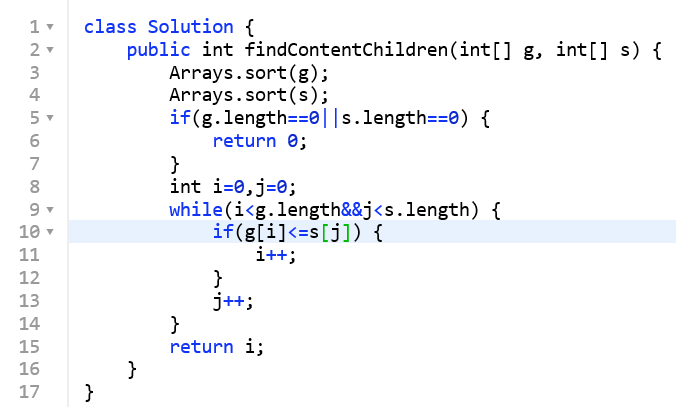Assume you are an awesome parent and want to give your children some cookies. But, you should give each child at most one cookie. Each child i has a greed factor gi, which is the minimum size of a cookie that the child will be content with; and each cookie j has a size sj. If sj >= gi, we can assign the cookie j to the child i, and the child i will be content. Your goal is to maximize the number of your content children and output the maximum number.
Note:
You may assume the greed factor is always positive.
You cannot assign more than one cookie to one child.
Example 1:
Input: [1,2,3], [1,1] Output: 1 Explanation: You have 3 children and 2 cookies. The greed factors of 3 children are 1, 2, 3. And even though you have 2 cookies, since their size is both 1, you could only make the child whose greed factor is 1 content. You need to output 1.
Example 2:
Input: [1,2], [1,2,3] Output: 2 Explanation: You have 2 children and 3 cookies. The greed factors of 2 children are 1, 2. You have 3 cookies and their sizes are big enough to gratify all of the children, You need to output 2.
题目描述:每个孩子都有一个满足度,每个饼干都有一个大小,只有饼干的大小大于等于一个孩子的满足度,该孩子才会获得满足。求解最多可以获得满足的孩子数量。
给一个孩子的饼干应当尽量小又能满足该孩子,这样大饼干就能拿来给满足度比较大的孩子。因为最小的孩子最容易得到满足,所以先满足最小的孩子。
证明:假设在某次选择中,贪心策略选择给当前满足度最小的孩子分配第 m 个饼干,第 m 个饼干为可以满足该孩子的最小饼干。假设存在一种最优策略,给该孩子分配第 n 个饼干,并且 m < n。我们可以发现,经过这一轮分配,贪心策略分配后剩下的饼干一定有一个比最优策略来得大。因此在后续的分配中,贪心策略一定能满足更多的孩子。也就是说不存在比贪心策略更优的策略,即贪心策略就是最优策略。
方法一:贪心算法
保证每次操作都是局部最优的,并且最后得到的结果是全局最优的。
时间复杂度:o(nlogn)
